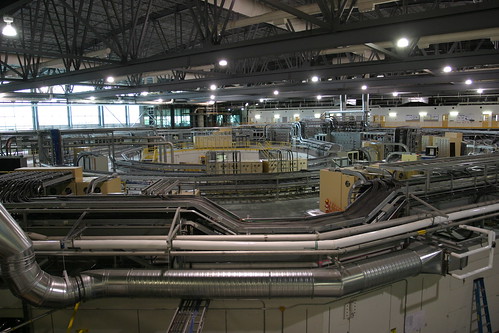My roommate asked me this afternoon about the difference between a double Americano and a double shot of espresso. I had barely gotten started before I realized that her eyes had glazed over. Point being, I am a huge nerd when it comes to coffee, even though I would describe myself as a very wussy barista. [1]
I love how nerdy baristas can get all excited about exacting precision and deliciousness out of their machines; they have all of these variables (time, temperature, grind, packing density, shot size, pore size, etc) that they conjure out some sort of formula that they claim is scientifically the best. A lot of them don't know anything, at least judging by the burnt or sour espresso they serve, but it's kind of cute to see them try.
It is pretty exciting then to see a company put some actual science behind that process. The George Howell Coffee company is selling a program called "ExtractMoJo," which basically tries to track all of the variables that go into the brew and correlate that with the flavour. The thing that's cool about it is that it ties in very nicely to a refractometer, which gives them a way to track total dissolved solids and the solubles extracted from the beans in the coffee. NERDY AND AWESOME!
Above is a graph from their website that plots TDS and % solubles to give a "flavour window" (an infiniflux term) for a good cuppa.
Coffee nerds and baristas have been beta testing it to come up with scientific(ish) recipes for the perfect cup:
Taste panels over the years have usually found that the best brewed coffee results when your technique is adjusted so that two criteria are met: (1) 19-21% of the dry coffee mass is extracted into your cup and (2) the resulting beverage is about 1.3% coffee solids and 98.7% water.
I'm curious to find out what sort of coffee all three of my readers drink. So, enter the poll or leave a comment! (note: RSS subscribers will have to visit the site).
(also, previously on Will and Beyond. That was/still is a bad ass paper).
1. I mean, I am terrrrrible at brewing my own coffee. I just recently got a handle on my little French Press. I can't imagine the large number of failures I'd have to go through to learn how to make coffee on an ultra fancy espresso machine. Hey, maybe I should get myself one of these ExtractMoJo programs to help practice!
2. Does anybody use a refractometer on a regular basis? I'm guessing the TDS are determined by scattering, similar to a DLS, and the soluble extracts are found by a change in refractive index. How would a refractometer measure those things?


1 comment:
Mmm... coffee. Most of the time I'm too lazy to make my own, and I just buy it from wherever, but when I'm not lazy I use a french press.
There needs to be more papers published about coffee. Ideally enough to justify a journal devoted to coffee chemistry.
Post a Comment